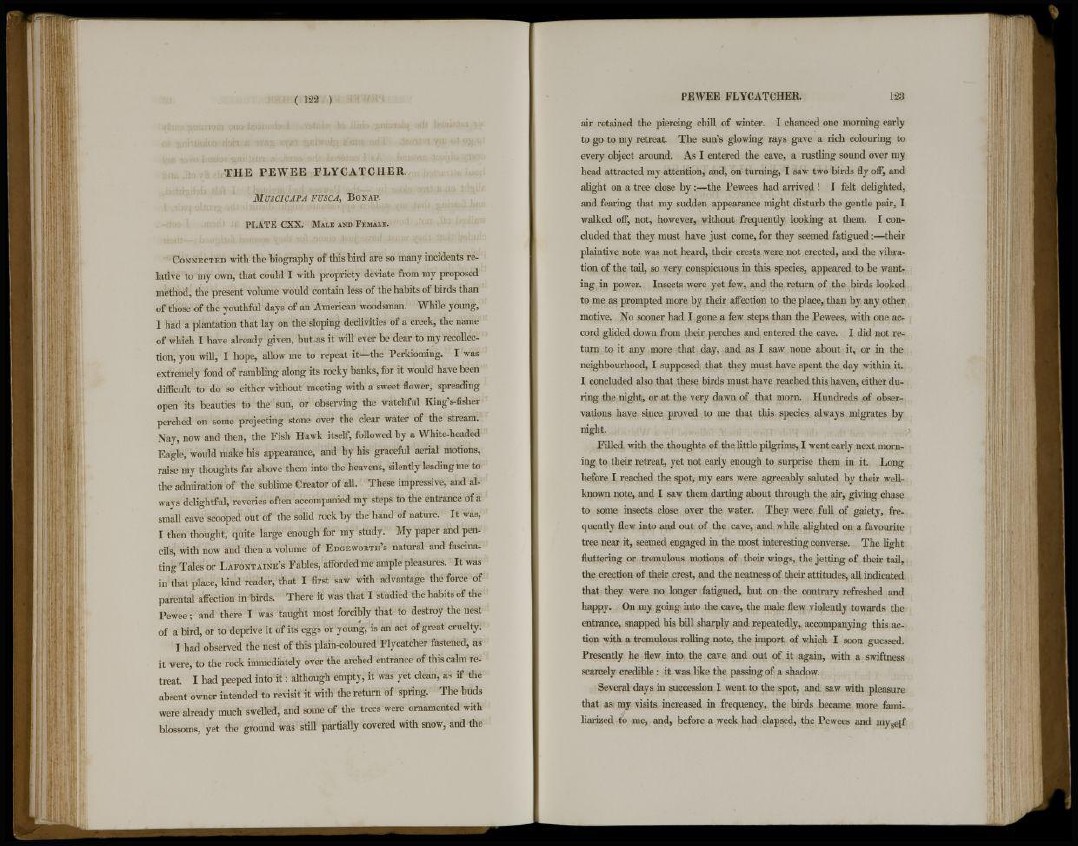
( 122 )
T H E P E W E E F L Y C A T C H E R .
MUSCICAPA FUSCA, BoNAP.
P L A T E C X X . MALE A N D F E M A L E .
CONNECTED with the biography of this bird are so many incidents relative
to my own, that could I with propriety deviate from my proposed
method, the present volume would contain less of the habits of birds than
of those of the youthful days of an American woodsman. While young,
I had a plantation that lay on the sloping declivities of a creek, the name
of which I have already given, but-as it will ever be dear to my recollection,
you will, I hope, allow me to repeat it—the Perkioming. I was
extremely fond of rambling along its rocky banks, for it would have been
difficult to do so either without meeting with a sweet flower, spreading
open its beauties to the sun, or observing the watchful KingVfisher
perched on some projecting stone over the clear water of the stream.
Nay, now and then, the Fish Hawk itself, followed by a White-headed
Eagle, would make his appearance, and by his graceful aerial motions,
raise my thoughts far above them into the heavens, silently leading me to
the admiration of the sublime Creator of all. These impressive, and always
delightful, reveries often accompanied my steps to the entrance of a
small cave scooped out of the solid rock by the hand of nature. It was,
I then thought, quite large enough for my study. My paper and pencils,
with now and then a volume of EDGEWORTH'S natural and fascinating
Tales or LAFONTAINE'S Fables, afforded me ample pleasures. It was
in that place, kind reader, that I first saw with advantage the force of
parental affection in birds. There it was that I studied the habits of the
Pewee; and there I was taught most forcibly that to destroy the nest
of a bird, or to deprive it of its eggs or young, is an act of great cruelty.
I had observed the nest of this plain-coloured Flycatcher fastened, as
it were, to the rock immediately over the arched entrance of this calm retreat.
I had peeped into it: although empty, it was yet clean, as if the
absent owner intended to revisit it with the return of spring. The buds
were already much swelled, and some of the trees were ornamented with
blossoms, yet the ground was still partially covered with snow, and the
PEWEE FLYCATCHER. 123
air retained the piercing chill of winter. I chanced one morning early
to go to my retreat. The sun's glowing rays gave a rich colouring to
every object around. As I entered the cave, a rustling sound over my
head attracted my attention, and, on turning, I saw two birds fly off, and
alight on a tree close by :—the Pewees had arrived ! I felt delighted,
and fearing that my sudden appearance might disturb the gentle pair, I
walked off, not, however, without frequently looking at them. I concluded
that they must have just come, for they seemed fatigued:—their
plaintive note was not heard, their crests were not erected, and the vibration
of the tail, so very conspicuous in this species, appeared to be wanting
in power. Insects were yet few, and the return of the birds looked
to me as prompted more by their affection to the place, than by any other
motive. No sooner had I gone a few steps than the Pewees, with one accord
glided down from their perches and entered the cave. I did not return
to it any more that day, and as I saw none about it, or in the
neighbourhood, I supposed that they must have spent the day within it.
I concluded also that these birds must have reached this haven, either during
the night, or at the very dawn of that morn. Hundreds of observations
have since proved to me that this species always migrates by
night.
Filled with the thoughts of the little pilgrims, I went early next morning
to their retreat, yet not early enough to surprise them in it. Long
before I reached the spot, my ears were agreeably saluted by their wellknown
note, and I saw them darting about through the air, giving chase
to some insects close over the water. They were full of gaiety, frequently
flew into and out of the cave, and while alighted on a favourite
tree near it, seemed engaged in the most interesting converse. The light
fluttering or tremulous motions of their wings, the jetting of their tail,
the erection of their crest, and the neatness of their attitudes, all indicated
that they were no longer fatigued, but on the contrary refreshed and
happy. On my going into the cave, the male flew violently towards the
entrance, snapped his bill sharply and repeatedly, accompanying this action
with a tremulous rolling note, the import of which I soon guessed.
Presently he flew into the cave and out of it again, with a swiftness
scarcely credible: it was like the passing of a shadow.
Several days in succession I went to the spot, and saw with pleasure
that as my visits increased in frequency, the birds became more familiarized
to me, and, before a week had elapsed, the Pewees and myself